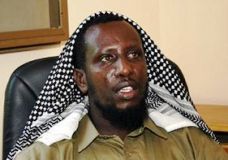Somali Islamists seek `understanding’ with US
June 12, 2006 (MOGADISHU) — The Islamist leader whose Islamic Courts Union militia seized control of this lawless east African capital last week after fierce fighting with U.S.-backed warlords said Monday that he seeks “an understanding” with the United States and denied that his group is sheltering al-Qaida terrorists.
 But in his first face-to-face interview with an American journalist since his forces’ triumph, Sheik Sherif Ahmed told Knight Ridder that he doesn’t plan full ties with the United States, and he dodged questions about his views on al-Qaida.
But in his first face-to-face interview with an American journalist since his forces’ triumph, Sheik Sherif Ahmed told Knight Ridder that he doesn’t plan full ties with the United States, and he dodged questions about his views on al-Qaida.
“The Americans were getting wrong information from the warlords, and since that strategy failed, the Americans have a good opportunity,” Ahmed said. “They can help us with offers of humanitarian assistance. We cannot say there will be full cooperation, but we can foresee an understanding between the United States and Somalia.”
He also said he would never agree to a call for international peacekeepers by Somalia’s nearly powerless transitional government, based 150 miles away in the city of Baidoa.
“They only brought destruction and killing when they were here,” he said. “There is no reason for the request for foreign troops. The cruel warlords were totally eliminated by the uprising.”
Ahmed has been the focus of international speculation about whether he plans to create a Taliban-style state that would shelter al-Qaida in this strategic Horn of Africa country. But Ahmed offered no clear political agenda during the interview, which was conducted in his heavily fortified office on a leafy residential street in the capital.
Ahmed said he believes “the world is truly governed by God,” but that his religious courts will reach out to intellectuals, secular politicians and clan elders as the Islamists craft a plan for the city.
“Our people have been freed from the warlords. Now, we want all Somali people to decide their future,” he said.
Outside, boyish-looking militia members, most still in their teens, patrolled in castoff military uniforms aboard trucks affixed with anti-aircraft artillery. There were no sounds of fighting, and residents said the militia introduced a fragile calm after 15 years of bloodshed.
The United States ended direct involvement in Somalia in 1994, after 18 Army Rangers were killed when rebels shot down a military helicopter in Mogadishu – an event dramatized in the film “Black Hawk Down.” In the years since, the city has been the subject of near constant violence as rival clans competed for control.
The Bush administration is widely believed to have begun providing covert funding to some of the warlords during the past year in an effort to thwart the Islamic Courts’ rise. It’s a claim the administration hasn’t confirmed, but one that Ahmed and others here believe.
President Bush said last week that the administration’s “first concern would be to make sure that Somalia does not become an al-Qaida safe haven, doesn’t become a place from which terrorists plot and plan.”
“So we’re watching very carefully developments there,” Bush said.
Somalis who took part in the formation of the Islamic Courts Union in 2003 say Ahmed, a scion of one of Somalia’s most powerful clans who studied law in Libya, was installed as chairman because of his reputation for fairness.
“He was the consensus person,” said Abdullahi M. Shirwa, a secular peace activist who was involved in the establishment of the Islamic Courts Union. “He got support from the clans, from the neighborhoods, from civil society and from the Islamists. He’s a politician more than he’s a religious man.”
In person, Ahmed appears far younger than his 42 years and eschews the traditional trappings of power. His entire two-story compound is treated as a holy site. Visitors are required to take off their shoes when entering, and Ahmed was barefoot throughout the interview. His office furnishings consisted of a desk and a chair. He declined to discuss personal details of his life. “I’m from the people,” he said.
During a casual first meeting Sunday night, he came across as charming, with a good sense of humor. But he was far more guarded during Monday’s formal interview, during which he occasionally shifted into fluent Arabic from his native Somali.
He didn’t lose his sense of humor, however. Asked to pose with a reporter for a picture, Ahmed at first hesitated. “It might be dangerous for you,” he said with a laugh, before agreeing to the request.
The Islamic Courts Union is still in battle mode, preparing for fresh clashes as the group moves to the outskirts of Mogadishu in a push to take the last warlord strongholds. Ahmed defended the leader of his military wing, Adan Hashi Ayro, who reportedly fought U.S. troops alongside the Taliban in Afghanistan.
“One should not be taken in by Western propaganda,” he said in response to questions about Ayro.
The sheik also said that the United States hasn’t responded to a letter he wrote in which he categorically denied that his group is sheltering al-Qaida figures thought to be responsible for attacks on American targets.
“Al-Qaida or terrorist members are not here at all,” Ahmed said. “As far as we know, the claims by the Americans against Somali suspects are exaggerated.”
(KRT)
